
Otaki
Final part of epic drama about war and its effects upon human beings, follows the fortunes of the Godai family through the Sino-Japanese War through the Soviet Union's sudden attack upon Japanese troops at the end of the war.

Otaki
Second part of an epic drama of war and its effects upon human beings, follows the fortunes of the Godai family from 1935 through Japan's invasion of China. Based on the novels by Jumpei Gomikawa, who also penned The Human Condition.

Contrast between two outlooks on life: one of a poor factory worker and the other the heir to millions.

Sixth film in the long-running series Daiei Studio's Woman Gambler with Kyoko Enami starring where she plays the woman gambler Ogin.

Tamiko Yamamoto
Kazuo, a Japanese army intelligence agent, reveals a foreign intelligence network in Japan and then sent to Borneo Island with a special mission.

Makiko
The daughter of a Prime Minister turns down the proposal of a young teacher when she falls for the wrong man. Despite the continual degradation by the man she loves, she is unwilling to leave her awful relationship.
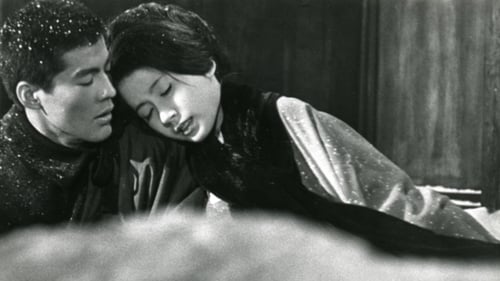
Suzuko, a woman in her twenties who has a brother with political problems (due to communist reprisals), lives for over five years in a love affair with Tate who's a young lieutenant in the Army, ultimately becoming a right-wing fundamentalist revolutionary. She marries another man, one totally dedicated to the rigorous practices of Noh theatre, in an arranged marriage, but the bond that connects her with Tate is too strong.

Otama, daughter of a poor candy vendor, becomes the mistress of a man whom she believes to be a widower and owner of a prosperous dry goods store. The man is in fact married with children, and is a despised loan shark who takes money from the poor without qualms. Totally enraptured with Otama, this usurer establishes her and her father in separate houses and generously gives them gifts including silk taken as interest from Oshige, a poor cloth dealer who does business with the sewing teacher, Otama's neighbor. Otama's satisfaction with her situation gradually crumbles as she discovers the truth about her benefactor.

Mrs. Kono
Adaptation of a famous Kyouka Izumi novel. Set in the early 1900's, it tells the story of the impossible love between a young scholar a beautiful geisha.

Harumi's mother-in-law
A woman becomes dissatisfied with her marriage and joins a political theater troupe to protest the U.S. Security Pact.

Lady Kokiden
Hikaru Genji, the haunted romantic hero of Lady Murasaki Shikibu’s “Genji Monogatari” (Tale of Genji) comes to life in this new tale of his further romantic adventures. Young Genji, the emperor’s illegitimate son cuts a swath through the women of the imperial court, while still mourning the spirit of his late mother who died while he was still a child. Driven to an obsession with the emperor’s new concubine, Lady Fujitsubo, whose resemblance to his late mother originally caught the eye of the emperor, young Genji embarks upon a reckless affair with her that could cost him his life.

Teruyo Fuji
Contemporary musical drama film by Yasuzo Masumura.

A young woman is attacked by a serial rapist and murderer whom her detective father is investigating. Though she survives, the impact of the event creates increasing discord and agony for her and her loved ones.
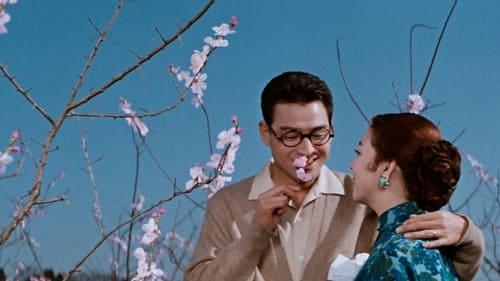
Izumi
Una joven japonesa de origen aristocrático recibe una propuesta de matrimonio por parte del hermano del emperador títere de Manchuria, ocupada por fuerzas militares niponas. A pesar de sus iniciales reticencias, tras conocer a su pretendiente accede a casarse.

The story tells of Tsuchiya, a university professor and a widower who is in love with a widow who runs a small restaurant, and his son is in love with a runaway girl who turns out to be the leader of a religious sect. Kusano is the henpecked proprietor of a rice biscuit shop who dreams of owning a bird and dog shop and his daughter is in love with a boarder, employed by the private detective agency searching for the runaway girl. The agency head has his own dream of arranging thirty marriages and has already accomplished twenty-seven. Tatsumi is a newspaper reporter who dreams of a big scoop to enable him to marry a girl TV producer and his friend a mountain climbing enthusiast who dreams of joining a Himalayan expedition but is opposed by his wife. His love of the mountains is shared by a boarder in their home and by a fishmonger's son.

Drama which shows the struggle of Fumiko, a female teacher, at work and at home.

A lifetime story of a woman who stubbornly lives in a poor mountain village in post-war Japan.

Tomie
Japanese suspense film.

Otsugi
Chuji Kunisada runs into strange adventures which tests his skill as a samurai as he untangles intrigue and murder against the backdrop of the majestic Mount Akagi.
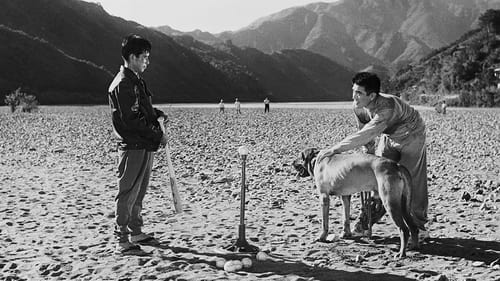
A talent scout moves sharply, dead-set on signing a promising athlete to the baseball team the Toyko Flowers.
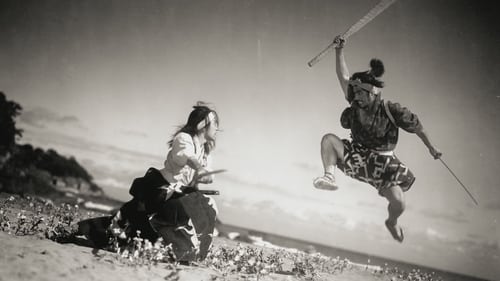
Oko (uncredited)
Takezo abandona su condición de samurai errante para vivir tranquila y humildemente con su amada Otsu, rechazando trabajar como maestro samurai para el líder del clan más poderoso del Japón. No obstante, Takezo accede a luchar con el joven y habilidoso guerrero Sasaki Kojiro. El combate final tendrá lugar en la isla Ganryu.
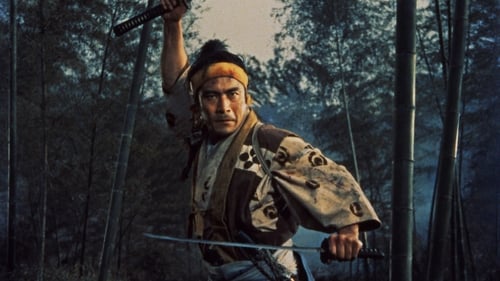
Oko
Tras años recorriendo multitud de lugares, labrando su reputación como el más grande luchador del Japón, Takezo regresa a Kioto para enfrentarse al líder de la más prestigiosa escuela de samurais de la región. Como demostración de su valor, Takezo se dirige deliberadamente hacia una emboscada preparada por los seguidores de la escuela, mientras el joven y brillante luchador Sasaki Kojiro le observa, con el convencimiento de que puede derrotar a Takezo...

Oren
The story about the rise and fall of the famed mercenaries, Shinsengumi, who are hired by a crumbling feudal government.
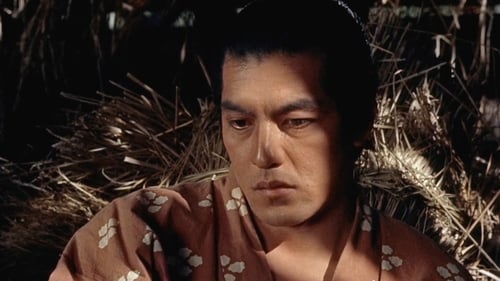
Oko
Dos amigos dejan su pueblo para combatir con su ejército. Ambos, tras una derrota en el frente, se cobijan en la solitaria casa de Oko, una viuda que vive con su hija. Matachachi dejará que Oko le seduzca y, junto con ella y su hija se irá a Tokio, olvidando a su prometida...
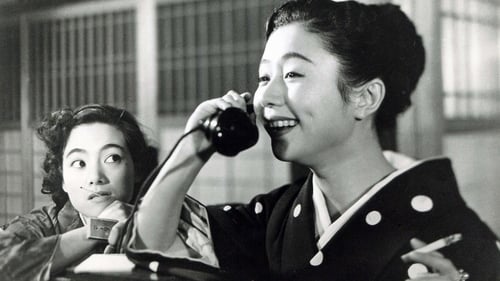
An Inn at Osaka, rarely seen outside Japan, follows the story of an insurance company executive from Tokyo, Mr. Mito, who is demoted to the Osaka office. He takes a room at a small inn and tries to rebuild his life. Notable for its exquisite framing and cinematography, An Inn at Osaka allows its complicated plotlines to disappear behind the minutiae of penury and humiliation that Mito and others suffer during the post-war economic and social reconstruction.

Akagashi
Tokyo, 1890. Through avarice, a series of misunderstandings, and failures of courage, the engagement of Kan-ichi (a student) and Miya (the daughter of Kan-ichi's debtor) is canceled to enable Miya to marry Tomiyama, a wealthy banker's son. In bitter despair, Kan-ichi breaks with his friends, drops his studies, and declares he has ceased to be human. He apprentices to a money-lender, and he's soon ruthless and wealthy. Several years later, Miya's in misery, her husband mistreats her. She goes to Kan-ichi to beg forgiveness; he pushes her away. He's now pursued by Akagashi, herself a cold-hearted loan shark. Can anything free Kan-ichi's hard heart from the golden demon

Nobuko Otowa won the Blue Ribbon for the Best Actress for this movie among others.
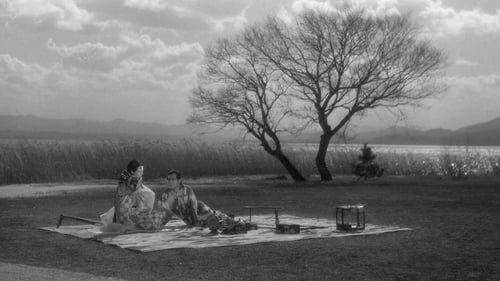
Ohama
En el Japón del siglo XVI, los campesinos Genjuro y Tobei venden sus vasijas de barro a un grupo de soldados en un pueblo cercano, desafiando la advertencia de un sabio local contra la búsqueda de ganancias en la guerra. La búsqueda de riquezas de Genjuro y de la misteriosa Lady Wakasa, así como el deseo de Tobei de convertirse en samurái, corren el riesgo de destruirlos a ellos mismos y a sus esposas, Miyagi y Ohama.

An intellectual couple in a staid and tedious marriage are surprised when the wife’s niece, who has run away from home, turns up unexpectedly to stay with them. Their mundane lives are sent into disarray by the emotional and energetic Ako.

Tokiwa

Group of women escape Chinese controlled area for Japanese occupied lands during Pacific War.

Dedication of the Great Buddha is a 1952 Japanese film directed by Teinosuke Kinugasa. It was entered into the 1953 Cannes Film Festival.

Horror film directed by Minoru Inuzuka.

Hibari no komoriuta (ひばりの子守唄, literally "Hibari's Lullaby") is a 1951 black-and-white Japanese film directed by Koji Shima. The movie is based on Das doppelte Lottchen, a novel later adapted as The Parent Trap.

Aoi no ue
Genji, the illegitimate offspring of a Japanese potentate, goes by the philosophy of "love 'em and leave 'em" as a matter of course. Only when his heart is broken by Awaji does Genji realizes how much pain he himself has caused.

A young man, convicted of a crime and imprisoned in the penitentiary, comes to believe that his wife is being unfaithful to him. He contrives his escape from the prison in order to seek her out and learn the truth, but the police give chase and he must flee into the mountains.
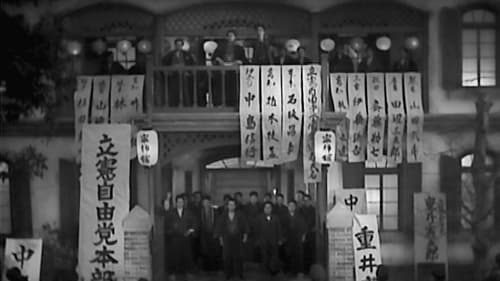
Chiyo
A woman's struggle for equality in Japan in the 1880s. Eiko Hirayama leaves Okayama for Tokyo, where she helps the fledgling Liberal Party and falls in love with its leader Kentaro Omoi, just as the party is being disbanded by the government.

Toshiko
Like many women after the war, Toshiko works as a chorus girl; her boyfriend Tadashi wishes she'd join him more frequently, but she detests his criminal involvement.

Koharu
Shogi, a Japanese form of chess, is a game that requires skill and determination. When poor sandal-maker Sakata decides to pursue his dream of becoming the Shogi Grand Master Champion, everything is at stake – including his family. What will it cost for Sakata to follow his passion?

Japanese war movie.
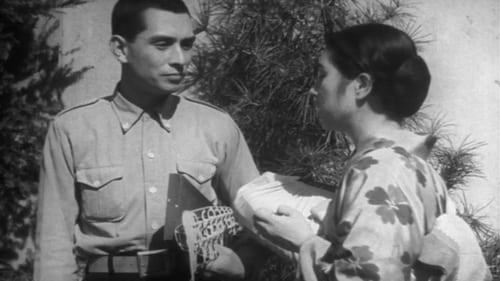
Takako
The few residents left on the streets in Tokyo share their individual stories and come to understand the melancholy of saying goodbye.

Japanese Warmovie

Chie, sister
Japanese propaganda film about the Normanton Incident.
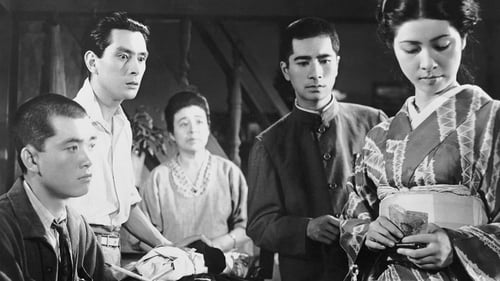
Oharu
The sweet but naive denizens of a charming port town are hoodwinked by a couple of con men at the outset of World War II. But the hustlers’ plan backfires when they come down with severe cases of conscience. Keisuke Kinoshita’s directorial debut is a breezy, warmhearted, and often very funny crowd-pleaser that’s a testament to the filmmaker’s faith in people.
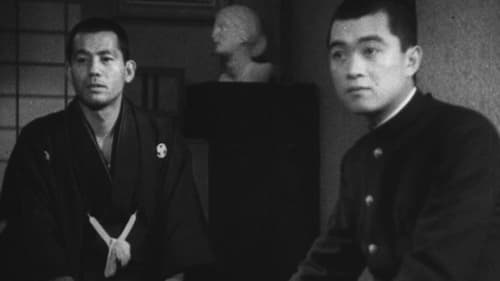
A family story in the year of 1943 during the war. The director is Shunkai Mizuho, who worked on "Hibari no Circus Sad Kobato" starring Hibari Misora after the war. Previously, there is only a 6-minute short version in the National Film Archive, therefore, the full version is this movie is very valuable. This is considered a masterpiece that depicts a happy family of 7 (a father, a mother, 3 sons and 2 daughters).They care about each other, and also trust each other. Father started to ask all the children "what do you want to be in the future?" since an early age. Boys said they want to go to college, they want to be painters, and when it comes to the girls, although they wanted to be generals, their answer was "become a bride, a wife, and a good mother." Brothers and sisters get along well and occasionally fight, but they all discuss the cause, and would apologize to each other. The story was so gentle that it is hard to believe it was during the war.

Amusing masterpiece from director Yoshimura Kazusabu divided in two parts taken from the newspaper serial novel of Shishiko Shishi. Like in "Warm Current", Shin Saburi, Mieko Takamine and Mitsuko Mito are appearing, but this is a fresh comedy very unusual for wartime.
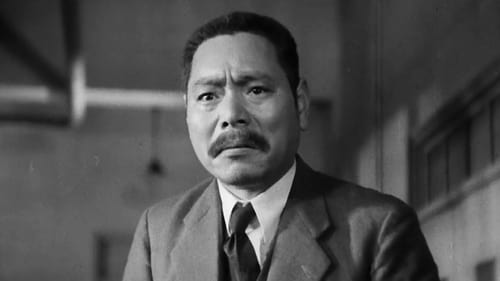
Fumi
En una ciudad provinciana, un profesor viudo lleva una vida modesta en compañía de su único hijo. Cuando en un viaje escolar, un alumno se ahoga en un lago, él asume la responsabilidad del accidente y dimite. Decide entonces abandonar la ciudad y trasladarse a su pueblo natal. Durante el viaje, padre e hijo discuten sobre el futuro y entre ellos se establece una relación al mismo tiempo cercana y distante. Un día el padre le anuncia que tiene la intención de mandarlo a estudiar a un internado. Años más tarde, el padre trabaja en Tokio y el hijo es maestro. En un encuentro el hijo le anuncia al padre que se va a la guerra.

A hostile Chinese nurse (Yamaguchi) who works in an orphanage is won over by the care and commitment of the Japanese doctor (Sano) who treats her wards. Disease outbreaks and family obligations, however, threaten to torpedo their budding romance.

Hana wa itsuwarazu (1941) is the second directorial work by Shochiku's Oba Hideo. Oba had previously worked as an assistant director to Shimizu Hiroshi and penned films for Shimazu Yasujiro. In this early effort, he is not stylistically very far from either, but then again all Shochiku directors resemble each other to a point. The film is an everyday romance for younger audiences, full of clean, ideal human beings.

Yayoi Kajikawa

Kinuyo is a daughter of rice cracker shop in downtown. She fell in love with her sister's boyfriend. It is a story whose theme is warm human relationships in a town of customs and manners.

Gin Ishiwata
Adaptation of Kishida Kunio's novel. Set against the backdrop of a power struggle within a hospital, depicts the love lives of the director's daughter, the administrative director, a doctor, and a nurse.

Jie (Michiko Kuwano) attended a women's university with the financial support of her geisha sister Oha (Hiroko Kawasaki) and became a lawyer. The aim. Michiko (Kuniko Miyake), one of the seven best friends from the same women's college, is getting married. The man she's marrying is her sister's lover.

Based on the original work by Fumiko Hayashi, this is a story about a woman and two men. The lust is restrained and indifferent. The story even has an elegance to it, which is the charm of the 30 year old Kinuyo Tanaka. There was a time when Tanaka was adorable... Shin Saburi was young and Chishu Ryu was young too. It is a promise of melodrama that the rival or friend is prettier than the heroine Kinyo.

A young doctor, Kozo Tsumura, falls for young nurse Katsue Takaishi. But she's got a secret: she's a widow with a son. Kozo and Katsue decide to run away to Kyoto, but her child suddenly became sick and she just missed the train and Kozo. She makes it to Kyoto finally, but is unable to meet him. Plus she isn't accepted into Kyoto society. She goes back to her hometown and tries to forget him. She quits the hospital to concentrate on her singing. She makes her professional debut with the hit "Aizen Katsura". Kozo is in the audience.

Shigeko
The movie follows a young woman (Kinuyo Tanaka), a daughter of a high-ranking businessman and his neglected mistress, as she struggles to ease her mother's loneliness, while also having an affair with her father's subordinate.

A Japanese wartime film directed by Yasushi Sasaki.

A 1937 Japanese film.

Woman at Hotel
Yuki is a young, single mother supporting herself and her son, Haru, with a job as a bar hostess.

Ohatsu
A Japanese screwball comedy about the battle between the sexes: two timid men, egged on by their wives, end up in a bitter duel over an expensive lace handkerchief.

During college military training exercises, the bond between two friends and athletic rivals is tested when one of them becomes involved with a woman who may be a prostitute.

Keiko
Episode in the life of a composer of a popular Japanese song.

Un carismático conductor de autobús es apodado "Arigatô-san (Sr. Gracias)" debido a las constantes palabras de agradecimiento que dirige a los peatones que le dejan paso en el camino. En uno de sus viajes desde el pueblo de Izu hasta la ciudad de Tokyo llevará en su autobús, entre otros variopintos personajes, a una madre que se ha visto obligada por la penuria económica a mandar a su hija a trabajar en un burdel.



















